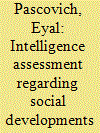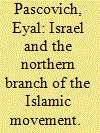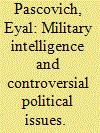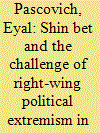|
|
|
Sort Order |
|
|
|
Items / Page
|
|
|
|
|
|
|
| Srl | Item |
| 1 |
ID:
160707


|
|
|
|
|
| Summary/Abstract |
Many intelligence services around the world maintain mechanisms intended to help minimize the risk of erroneous intelligence assessments. One of the best-known mechanisms is the ‘devil’s advocate’ whose goal is to present – sometimes artificially – an intelligence assessment that contradicts the prevailing view. The goal of this practice is to try to encourage doubts, both among intelligence assessors and among decision-makers. This paper will describe the importance and function of the 'devil’s advocate' mechanism in intelligence. Using Israel as a test case, the paper will seek to draw conclusions regarding the desirable format of operations of this mechanism.
|
|
|
|
|
|
|
|
|
|
|
|
|
|
|
|
| 2 |
ID:
119421


|
|
|
|
|
| Publication |
2013.
|
| Summary/Abstract |
The wave of protests that began in December 2010 and swept the Arab world ended dozens of years of regime stability in the Middle East. The spontaneous outpouring of the masses into the streets in protest of numerous years of dictatorship, tyranny, and corruption, for instance, in Egypt, took by surprise even those who allegedly understand the Egyptian street: journalists and academic experts active in this field; Western intelligence services, particularly in the United States and Israel, two countries that perceived Egyptian president Hosni Mubarak as an essential ally and an island of stability; and even among the Egyptian security and intelligence services, which, as in other dictatorial regimes, had invested considerable efforts into the regime's preservation.
|
|
|
|
|
|
|
|
|
|
|
|
|
|
|
|
| 3 |
ID:
118385


|
|
|
|
|
| Publication |
2013.
|
| Summary/Abstract |
The Israeli Islamic Movement's Northern Branch and its leader Sheikh Ra'id Salah pose a complex and multi-dimensional challenge for the State of Israel: political, national, socioeconomic and religious. Its most prominent manifestation is the movement's striving for separatism and open defiance of Israel's Jewish character. The government has sought - with limited success - to draw 'red lines' for the movement and its leaders and its occasional threats of harsher measures, including outlawing the movement, have failed to achieve the desired result.
|
|
|
|
|
|
|
|
|
|
|
|
|
|
|
|
| 4 |
ID:
131109


|
|
|
|
|
| Publication |
2014.
|
| Summary/Abstract |
Contrary to intelligence services in other democracies worldwide, the activity of the Israeli Directorate of Military Intelligence, AMAN, is not merely centered around collection and research regarding military intelligence matters. Instead, AMAN covers the majority of intelligence activity arenas, including intelligence regarding state-related issues. This field of activity presents a situation where AMAN's officers, and predominantly, its research division, are compelled to deal with sensitive issues embedded well within Israeli political and public controversy. This is commonly illustrated in the field of 'Intelligence for Peace' in general and more specifically in the Palestinian arena. Intelligence research surrounding the question of Palestinian commitment to peace throughout the Oslo Process and following the onset of the al Aqsa Intifada - activity classified as 'Intelligence on Intentions' - placed AMAM at the heart of political debate in Israel and resulted in bitter internal disagreements in AMAN as well as tensions between the intelligence service and the political leadership. Throughout the years, numerous recommendations have been repeatedly voiced to end AMAN's monopoly over Israel's national intelligence assessment (including aspects of intelligence regarding state-related issues). These recommendations were based predominantly on hindsight evaluations, such as AMAN's repeated failures in intelligence assessments. This paper calls for gradual termination of AMAN's activity of intelligence regarding state-related issues, in light of its contradiction with the appropriate military-political separation in a democratic society. Moreover, it places AMAN at the heart of the political debate dividing Israeli society.
|
|
|
|
|
|
|
|
|
|
|
|
|
|
|
|
| 5 |
ID:
151785


|
|
|
|
|
| Summary/Abstract |
Early in 1990, Carmi Gillon, a high-ranking official in the Israel Security Agency (commonly known as Shabak or Shin Bet), submitted his master’s thesis to the Political Science Department of the University of Haifa under the title “Ideologically Motivated Law-breaking of the Extreme Right within the Context of the Israeli-Arab conflict.
|
|
|
|
|
|
|
|
|
|
|
|
|
|
|
|
|
|
|
|
|